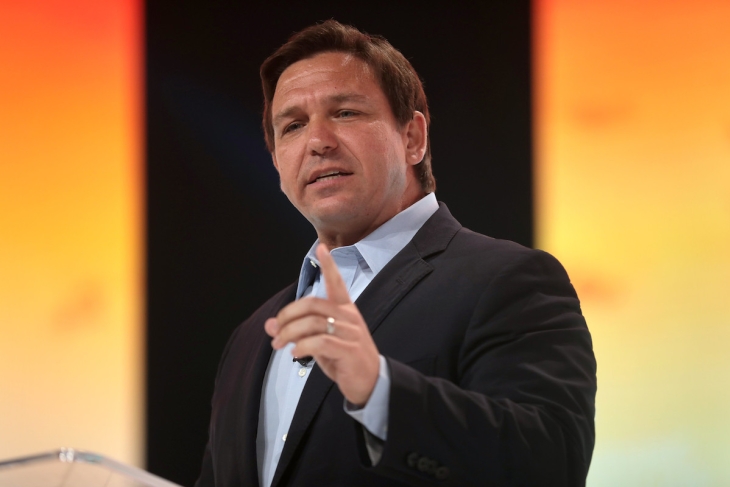Ready or not, the 2024 race for president is already in full swing. Like bad plastic surgery, this ordeal will be ugly and expensive. Just last month, former president Donald Trump unleashed a raft of divisive education proposals in what may presage an elevated role for what is usually a tertiary issue for voters. While his plan is red meat for the GOP’s hardcore base, last fall’s disappointing (for Republicans) midterms suggest that these same ideas are a major turn-off for the independents and swing voters needed to win the presidency. Still, it’s worth examining how leading Republican candidates plan to wield education as a cudgel in their pursuit of power and whether their tack leaves any room to pivot in the general election.
Unlike 2016’s free-for-all, the 2024 nomination fight has two clear contenders: Trump and Florida Governor Ron DeSantis. Both have tapped into the poor handling of school responses during the pandemic and both have also taken active roles in today’s culture war-driven version of school reform. Notably, during Trump’s time in office, his education platform focused less on cultural elements and more on Betsy DeVos’s desire to expand school choice, especially the private school variety. This time around, Trump says “we’re not going to allow anybody to hurt our children,” calling for all teachers to “embrace patriotic values” and for all students to receive a “pro-American education.”
Replete with dog whistles and ad hominems, Trump’s grievance-based manifesto doubles down on the fear-mongering that has characterized the GOP’s education strategy over the last few years. Under the banner of “protecting children,” he’s riffing from the GOP playbook that says schools are teaching kids that America is irredeemable, encouraging them to switch genders, peddling pornographic library books, allowing transgender girls to compete in girls’ sports, and hiding their liberal propaganda from parents. Once upon a time, funhouse-mirror politics like this would have been dismissed, by Republicans and Democrats alike, as a distraction from the principal goal of ensuring that more students could read, write, and compute proficiently. The tenor of the times ignores the fact that schools continue to struggle mightily with this assignment.
For his part, DeSantis hasn’t officially made a presidential announcement and isn’t expected to until after the state’s legislative session, which ends in May. Like Trump, DeSantis hasn’t shrunk from political fights, as evidenced by his decision to offer up endorsements in thirty school board races last year. But he has been far more disciplined than the former president, demonstrating an ability to extend his appeal on education beyond the GOP’s base, including his proposals to nix state testing and to raise teacher pay. At the same time, DeSantis’s handlers have proven adept at stoking the panicked media coverage of the present zeitgeist and cynically exploiting it to their advantage—most recently with the dustup involving the AP African American Studies course. When DeSantis jumps in, expect him to lead the charge in turning culture war crusades into national issues.
Other current and erstwhile GOP governors could soon join the fracas. Former South Carolina Governor Nikki Haley just threw her hat into the ring. Another one to watch will be Virginia Governor Glenn Youngkin. Along with DeSantis, Youngkin has been held up as an exemplar of how education can be used by Republicans to win purple states by appealing to a broad cross-section of the electorate while selectively picking his battles—like the National Merit Scholarship spat. Indeed, Youngkin’s gubernatorial campaign micro-targeted its messages on education with nine different education models for nine different types of education voters. As one of his key political advisers described this strategy:
It was a very sophisticated, deliberate goal to make education the forefront. We made a decision very early on in 2021 that we were going to go on offense on education because Republicans always played defense, and it wasn’t an easy decision and all of these people said we were crazy, but it ended up working out.
Yet as in the recent midterms, Republicans risk overplaying their hand again. Not content to smartly build upon the post-pandemic swing in public trust on education, Trump and DeSantis seem bent on waging explosive, culture-clash-fueled fights over race, gender, and pedagogy, even though most parents simply see this stuff as “background noise.” What’s more, the GOP’s approach is not about persuading more people to “protect” kids; it’s about embarrassing and humiliating people if they don’t do so on the GOP’s distorted terms and conditions. As a result, whoever emerges from this hostile primary contest will more than likely be mortally wounded in the general. Which is also bad for kids because Democrats, too, have proven themselves all-but-impervious to advancing good policy.
America’s education system buckled under the weight of the pandemic. School closures and related policies were often overzealous and went on for far too long. Test scores in reading and math plummeted to levels unseen for decades. Adult interests were unapologetically put ahead of children’s needs. To be sure, these structural breakdowns were largely the result of state- and local-level failures, not federal. Nevertheless, the nationalization of our politics makes it difficult, if not impossible, to ignore the grotesque rhetoric coming from Trump and DeSantis. Insofar as schooling is concerned, the 2024 election is shaping up to be a scum pit of unserious ideas no matter which of these two brawlers ends up grabbing the brass ring.


